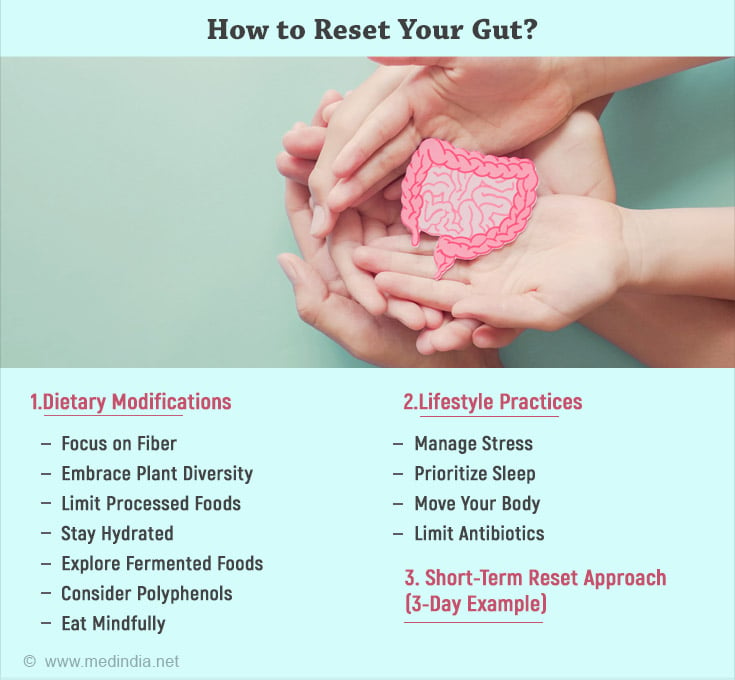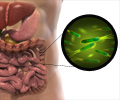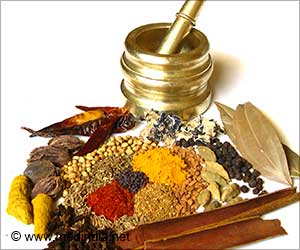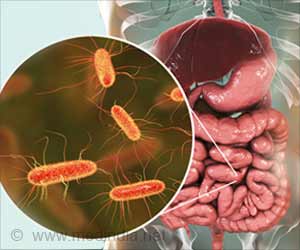- Gut Health - (https://www.betterhealth.vic.gov.au/health/healthyliving/gut-health)
- Resetting gut microbiome is a long-term project - (https://www.uclahealth.org/news/article/resetting-gut-microbiome-is-a-long-term-project)
About
The gut, also known as the gastrointestinal (GI) tract or digestive tract, is a complex system in the body responsible for digesting food, absorbing nutrients, and eliminating waste. It includes various organs such as the mouth, esophagus, stomach, small intestine, large intestine (colon), rectum, and anus.
Did You Know?
Your gut microbiome plays a crucial role in digestion, immune function, and even mood regulation. #guthealth #medindiaWithin your gut lies a hidden world – the gut microbiome. This microbiome is a vast community of trillions of microorganisms, including bacteria, viruses, and fungi(1✔ ✔Trusted Source
Gut Health
Go to source).
The Importance of a Healthy Gut Microbiome
These gut microbes play a crucial role in your overall health. They help with digestion, nutrient absorption, immune function, and even mood regulation. A balanced and diverse gut microbiome is essential for good health. Conversely, an imbalance in the gut microbiome has been linked to various health conditions, including(2✔ ✔Trusted Source
Resetting gut microbiome is a long-term project
Go to source):
- Digestive issues like irritable bowel syndrome, constipation, and diarrhea
- Skin problems like eczema and psoriasis
- Mental health conditions like anxiety and depression
- Autoimmune diseases like rheumatoid arthritis and inflammatory bowel disease (IBD)
- Certain cancers
Did You Know?
Babies born via C-section may have a different gut microbiome composition compared to those born vaginally. #guthealth #medindiaSigns of an Unhealthy Gut
Digestive Issues
- Upset Stomach: Frequent discomfort, gas, bloating, constipation, diarrhea, and heartburn are all potential signs that your gut is struggling to process food and eliminate waste effectively.
- Food Intolerances: Difficulty digesting certain foods, leading to bloating, gas, nausea, abdominal pain, and diarrhea, could indicate imbalances in your gut bacteria.
Other Potential Signs
- Fatigue: Chronic fatigue or low energy levels might be linked to an unhealthy gut microbiome.
- Sleep Problems: Difficulty sleeping or disturbed sleep patterns can be associated with gut imbalances.
- Skin Conditions: Skin issues like eczema, psoriasis, or acne flare-ups could be influenced by gut health.
- Mood Changes: Research suggests a connection between gut health and mental health. You might experience higher stress, low mood, or anxiety if your gut microbiome is out of balance.
- Unexplained Weight Fluctuations: Unintentional weight gain or loss can sometimes be linked to gut health issues.
How to Improve Your Gut Health
Improving gut health involves making gradual and sustained changes to enhance the overall function and balance of the gut microbiome over time.
Dietary Modifications
- Eat a High-Fiber Diet: Aim for at least 25-30 grams of fiber daily from sources like fruits, vegetables, legumes, whole grains, and nuts. Fiber feeds the good bacteria in your gut.
- Incorporate a Variety of Plant-Based Foods: The wider the range of fruits and vegetables you consume, the more diverse your gut microbiome will be. Aim for at least 30 different types a week.
- Limit Processed Foods: Processed foods often lack nutrients and contain ingredients that can harm your gut bacteria. Opt for whole, unprocessed foods whenever possible.
- Stay Hydrated: Water is essential for digestion and helps move waste through your gut. Aim for eight glasses of water daily.
- Consider Fermented Foods: Fermented foods like yogurt, kimchi, sauerkraut, kefir, and kombucha contain live bacteria that can benefit your gut health.
- Include Foods Rich in Polyphenols: Polyphenols are plant compounds found in fruits, vegetables, nuts, seeds, tea, coffee, and dark chocolate that may positively impact your gut microbiome.
- Eat Mindfully: Chewing your food thoroughly and eating slowly allows for better digestion and reduces discomfort.
Lifestyle Practices
- Manage Stress: Chronic stress can disrupt your gut health. Practice relaxation techniques like yoga, meditation, or deep breathing to manage stress levels.
- Get Enough Sleep: Aim for 7-8 hours of quality sleep each night to support a healthy gut microbiome.
- Exercise Regularly: Regular physical activity, particularly cardiovascular exercise like walking or cycling, can stimulate gut motility and positively affect the gut microbiome.
- Limit Antibiotics: Only take antibiotics when prescribed by a doctor and for the recommended duration. Unnecessary antibiotics can harm your gut bacteria.

How to Reset Your Gut
While the concept of completely "resetting" your gut is evolving and there's no one-size-fits-all approach, several dietary and lifestyle changes can significantly improve your gut health. This is a more intensive, often shorter-term intervention aimed at quickly rebalancing and restoring gut health, often after it has been significantly disrupted. Here are some strategies to consider:
Dietary Modifications
- Focus on Fiber: Aim for at least 25-30 grams of fiber daily from fruits, vegetables, legumes, whole grains, and nuts. Fiber feeds the good bacteria in your gut and promotes a healthy environment.
- Embrace Plant Diversity: Eat a wide variety of fruits and vegetables to encourage a diverse gut microbiome.
- Limit Processed Foods: Processed foods often lack nutrients and contain ingredients that can harm your gut bacteria. Choose whole, unprocessed foods whenever possible.
- Stay Hydrated: Water is essential for digestion and helps move waste through your gut. Aim for eight glasses of water daily.
- Explore Fermented Foods: Fermented foods like yogurt, kimchi, sauerkraut, kefir, and kombucha contain live bacteria that can benefit your gut health. Start slowly and gradually increase intake.
- Consider Polyphenols: Include foods rich in polyphenols like fruits, vegetables, nuts, seeds, tea, coffee, and dark chocolate in your diet. These plant compounds may positively impact your gut microbiome.
- Eat Mindfully: Slow down, chew your food thoroughly for better digestion and reduced discomfort.
Lifestyle Practices
- Manage Stress: Chronic stress disrupts your gut health. Practice relaxation techniques like yoga, meditation, or deep breathing to manage stress levels.
- Prioritize Sleep: Aim for 7-8 hours of quality sleep each night to support a healthy gut microbiome.
- Move Your Body: Regular physical activity, particularly cardiovascular exercise like walking or cycling, can stimulate gut motility and positively affect the gut microbiome.
- Limit Antibiotics: Only take antibiotics when prescribed by a doctor and for the recommended duration. Unnecessary antibiotics can harm your gut bacteria.
Short-Term Reset Approach (3-Day Example)
The Short-Term Reset Approach is a focused, intensive dietary intervention designed to quickly rebalance and restore gut health, typically over a period of three days. This method aims to provide a rapid boost to the gut microbiome, especially after it has been disrupted, such as by poor dietary habits, illness, or antibiotic use.
Focus on High-Fiber Foods: Incorporate high-fiber foods like fruits, vegetables, legumes, and whole grains into every meal. Gradually increase your fiber intake to avoid bloating or gas. This short-term approach can jumpstart positive changes in your gut environment.
Important Considerations
- Gut health is a complex and evolving field. Consistency is key for long-term improvement.
- Consult a doctor or registered dietitian for personalized advice, especially if you have underlying health conditions.
- There are no quick fixes or miracle cures for gut health. Focus on adopting healthy lifestyle habits for sustained improvement.
Foods for Good Gut Health
- Fruits and Vegetables: Apples, berries, leafy greens, broccoli, asparagus
- Legumes: Beans, lentils, chickpeas, peas
- Whole Grains: Oats, brown rice, quinoa, whole-wheat bread
- Nuts and Seeds: Almonds, walnuts, chia seeds, flaxseeds
- Yogurt: With live and active cultures like Lactobacillus and Bifidobacterium
- Kefir: Fermented milk drink rich in probiotics
- Kimchi: Spicy Korean fermented cabbage.
- Sauerkraut: Fermented cabbage rich in probiotics.
- Kombucha: Fermented tea drink containing probiotics (consume in moderation due to sugar content).
- Garlic and Onions: Contain prebiotics that nourish good gut bacteria.
- Artichokes: Promote the growth of beneficial bacteria.
- Bananas: Ripe bananas are a good source of prebiotics.
- Dark Chocolate: In moderation, dark chocolate (at least 70% cacao) contains prebiotics.
- Olive Oil: Heart-healthy oil with potential gut-boosting properties.
Gut health is a complex and evolving area of research. There's no one-size-fits-all approach, and the best way to improve your gut health is to focus on an overall healthy lifestyle.
While some short-term dietary changes can jumpstart the process, long-term consistency is key.
Consult a doctor or registered dietitian for personalized advice, especially if you have underlying health conditions.
By following these tips and maintaining a healthy lifestyle, you can create an environment that fosters a balanced and thriving gut microbiome, ultimately contributing to your overall health and well-being.










